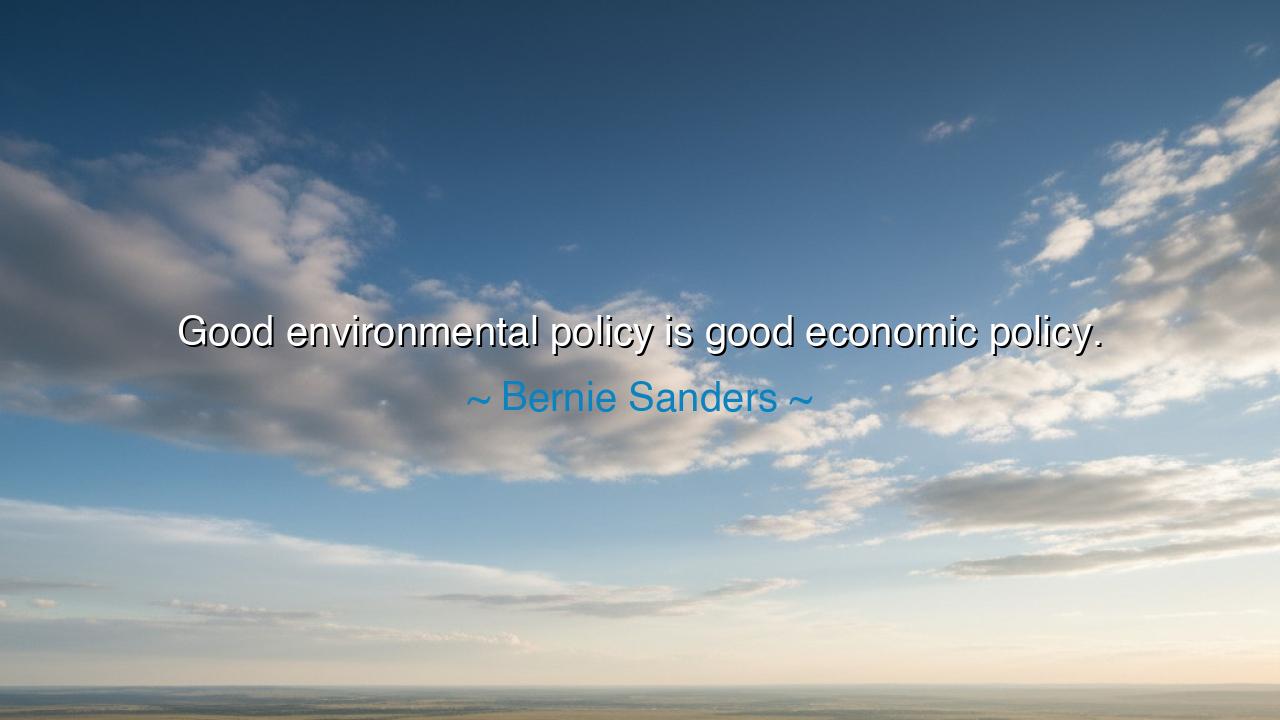
Good environmental policy is good economic policy.






In the chronicles of human civilization, where nations rise and fall by the fruits of the earth, Bernie Sanders’ words ring with the gravity of ancient truth: “Good environmental policy is good economic policy.” In these few words, he unites two forces often seen as adversaries—the prosperity of humankind and the preservation of nature. His message is not merely political, but moral and eternal: that the well-being of the earth and the wealth of its people are bound by one thread, and that to harm one is to impoverish the other.
From the dawn of civilization, wise rulers understood this harmony. The ancient Egyptians revered the Nile River as the lifeblood of their nation; when its waters were cared for, their granaries overflowed, and when it was neglected or overused, famine came swiftly. The lesson was as clear then as it is now: prosperity depends upon balance. Sanders’ declaration echoes this timeless principle—that true economic strength cannot stand upon the ruin of the environment, for the soil that feeds us and the air that sustains us are the foundation of all commerce and life.
The Industrial Revolution, though a triumph of human ingenuity, became a warning to later generations. Cities grew rich, but the skies darkened with smoke; wealth was forged in iron, yet rivers ran black with waste. It was only when the cost of this progress was measured in the health of people and the desolation of landscapes that humanity began to awaken to a deeper understanding. Modern economists and environmentalists alike have learned what Sanders proclaims: that sustainability is not the enemy of prosperity—it is its guardian.
Consider the story of Denmark, a nation once dependent on coal. Through vision and resolve, it invested in renewable energy, transforming wind into wealth. Today, its clean energy industry employs thousands, fuels its economy, and inspires the world. The same can be said for nations that preserve forests, restore rivers, and build green cities; their investments yield not only cleaner air and stable climates, but enduring economic growth. Thus, Sanders’ words become not a dream, but a lived reality: good environmental policy generates innovation, creates jobs, and builds resilience for the future.
The ancient philosophers might have called this principle “harmony between the elements.” For just as the body cannot thrive when the heart or lungs are diseased, so too a civilization cannot prosper when its rivers are poisoned or its air choked with smog. Economic policy that ignores the planet is like a ship that burns its own hull for warmth—it may feel rich for a moment, but soon it sinks. To align economy with ecology is to act with foresight and reverence for life itself.
Yet, Sanders’ quote also carries a moral command: that we must redefine what we mean by “value.” The ancients measured wealth in land and harvest; modern societies measure it in currency. But true wealth—lasting, generational wealth—lies in clean water, fertile soil, and thriving communities. To treat the earth as expendable is to mortgage the future for fleeting comfort. The wise know that the richest legacy is not in gold, but in the green of forests, the blue of oceans, and the health of children yet unborn.
The lesson for all who hear these words is this: build economies that heal, not harm. Let every policy, every business, and every act of progress be guided by the question—does this sustain life, or diminish it? Support industries that protect the earth, invest in innovation that renews rather than consumes, and hold leaders accountable for the stewardship of creation. The fate of the economy and the fate of the environment are one and the same thread, woven tightly through the fabric of civilization.
Thus, Bernie Sanders’ declaration endures as a teaching worthy of the ancients: “Good environmental policy is good economic policy.” It is not the rhetoric of politics but the law of nature itself. When we honor the earth, the earth rewards us with abundance. When we preserve her balance, we ensure our prosperity. Let every generation remember—sustainability is not sacrifice, but wisdom; and the truest economy is one that keeps faith with the living world from which all wealth flows.






AAdministratorAdministrator
Welcome, honored guests. Please leave a comment, we will respond soon